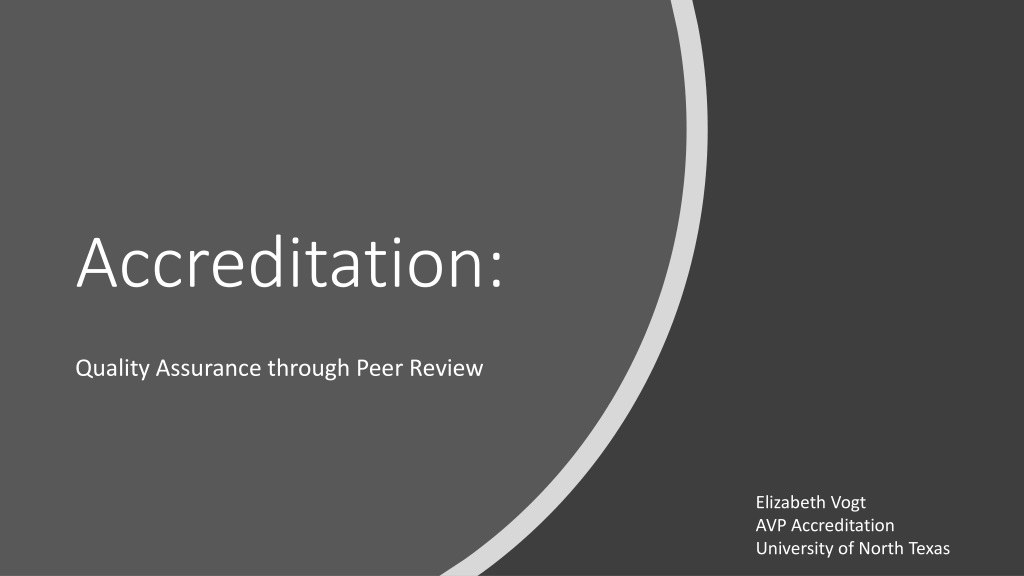

0 likes | 85 Views
Accreditation plays a crucial role in ensuring the quality and value of degrees in higher education. This peer review process helps institutions maintain standards, access funding, and demonstrate continuous improvement. However, institutions can go wrong by not addressing standards comprehensively or providing sufficient evidence of compliance. Success at institutions like the University of North Texas involves a strategic approach, teamwork, and detailed planning. Recommendations include timely assessment, effective communication, and thorough faculty credentialing.

E N D
Accreditation: Quality Assurance through Peer Review Elizabeth Vogt AVP Accreditation University of North Texas
Agenda •Accreditation – A very brief history •Why accreditation is important •Where we often go wrong •QEP •Success and lessons learned at UNT •Recommendations
Brief History Accreditation • Accreditation through the peer review process has been around for over 100 years • 1965 Higher Education Act: Accrediting agencies reviewed every 5 years by the federal government Eaton, J. S. (2018). Fifty Years as an Opportunity—for Change Magazine, Accreditation, and the Rest of Us. Change: The Magazine of Higher Learning, 50(3-4), 124-127
Accrediting Accreditors: National Advisory Committee on Institutional Quality and Integrity (NACIQI)
Accreditation Now • Extensive government oversight of accreditation • More than 200 billion in higher education (HE) funding • Rising cost of HE • Public Accountability • Accrediting agencies act as a buffer • Attempt to keep the focus on quality and improvement Eaton, J. S. (2018). Fifty Years as an Opportunity—for Change Magazine, Accreditation, and the Rest of Us. Change: The Magazine of Higher Learning, 50(3-4), 124-127
• A public assurance of quality • An assurance that our degrees meet standards and have value in the marketplace • Access to federal financial aid • Opportunities for students to transfer credit • Assurance of fiscal responsibility • Assurance that we are investing in continuous quality improvement Accreditation provides:
Where do institutions go wrong? • By not addressing every part of every standard • Lack of proof for an ongoing systematic process for compliance • A single year’s worth of evidence will not show an ongoing process Reviewers • By not providing enough detail- Proof = Evidence
• Derived from an institution’s ongoing comprehensive planning and evaluation process • Focus is on an issue the institution considers important to improving student learning and/or student success • Must have broad-based support • Should impact a significant student population • Must have resources committed • Must have an assessment plan • Use the SACSCOC suggested format: Page 40- • https://sacscoc.org/app/uploads/2020/03/Hand book-for-Institutions-Seeking-Reaffirmation.pdf 7.2- Quality Enhancement Plan (QEP)
DO: Submit 7.2 information to the off-site for review! DO: Research potential candidates to be the QEP lead evaluator* (Due 3+ months before visit) https://sacscoc.org/app/uploads/2020/01/Larry-Earvin-and-Charles-Taylor_Submitting-the-QEP-and- Preparing-for-the-Committee-Visit_Presentation.pdf
Our Success at UNT Lessons Learned • Use headings liberally Annual process for outcomes assessment • Leave time to review Biannual process for general education (Texas Core) • Highlight important areas in your report • Judicious use of consultants Teamwork
• Deadlines • SLO reporting- Move up the due date! • Have a draft of your QEP (7.2) for the off-site review • Be vocal about your QEP- Ensure all constituents know about it • Be detailed in your faculty credentials
Questions Elizabeth.Vogt@unt.edu